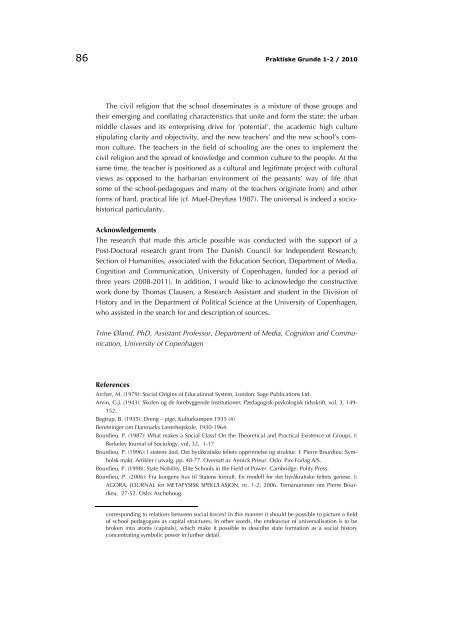Download - Praktisk Grunde
Download - Praktisk Grunde
Download - Praktisk Grunde
Create successful ePaper yourself
Turn your PDF publications into a flip-book with our unique Google optimized e-Paper software.
86 <strong>Praktisk</strong>e <strong>Grunde</strong> 1-2 / 2010<br />
The civil religion that the school disseminates is a mixture of those groups and<br />
their emerging and conflating characteristics that unite and form the state: the urban<br />
middle classes and its enterprising drive for ‘potential’, the academic high culture<br />
stipulating clarity and objectivity, and the new teachers’ and the new school’s com-<br />
mon culture. The teachers in the field of schooling are the ones to implement the<br />
civil religion and the spread of knowledge and common culture to the people. At the<br />
same time, the teacher is positioned as a cultural and legitimate project with cultural<br />
views as opposed to the barbarian environment of the peasants’ way of life (that<br />
some of the school-pedagogues and many of the teachers originate from) and other<br />
forms of hard, practical life (cf. Muel-Dreyfuss 1987). The universal is indeed a socio-<br />
historical particularity.<br />
Acknowledgements<br />
The research that made this article possible was conducted with the support of a<br />
Post-Doctoral research grant from The Danish Council for Independent Research,<br />
Section of Humanities, associated with the Education Section, Department of Media,<br />
Cognition and Communication, University of Copenhagen, funded for a period of<br />
three years (2008-2011). In addition, I would like to acknowledge the constructive<br />
work done by Thomas Clausen, a Research Assistant and student in the Division of<br />
History and in the Department of Political Science at the University of Copenhagen,<br />
who assisted in the search for and description of sources.<br />
Trine Øland, PhD, Assistant Professor, Department of Media, Cognition and Commu-<br />
nication, University of Copenhagen<br />
References<br />
Archer, M. (1979): Social Origins of Educational System, London: Sage Publications Ltd.<br />
Arvin, G.J. (1943): Skolen og de forebyggende Institutioner, Pædagogisk-psykologisk tidsskrift, vol. 3, 149-<br />
152.<br />
Begtrup, B. (1935): Dreng – pige, Kulturkampen 1935 (4)<br />
Beretninger om Danmarks Lærerhøjskole, 1930-1964.<br />
Bourdieu, P. (1987): What makes a Social Class? On the Theoretical and Practical Existence of Groups. I:<br />
Berkeley Journal of Sociology, vol. 32, 1-17<br />
Bourdieu, P. (1996): I statens ånd. Det byråkratiske feltets opprinnelse og struktur. I: Pierre Bourdieu: Symbolsk<br />
makt. Artikler i utvalg, pp. 48-77. Oversatt av Annick Prieur. Oslo: Pax Forlag A/S.<br />
Bourdieu, P. (1998): State Nobility. Elite Schools in the Field of Power. Cambridge: Polity Press.<br />
Bourdieu, P. (2006): Fra kongens hus til Statens fornuft. En modell for det byråkratiske feltets genese. I:<br />
AGORA. JOURNAL for METAFYSISK SPEKULASJON, nr. 1-2, 2006. Temanummer om Pierre Bourdieu,<br />
27-52. Oslo: Aschehoug.<br />
corresponding to relations between social forces? In this manner it should be possible to picture a field<br />
of school pedagogues as capital structures. In other words, the endeavour of universalisation is to be<br />
broken into atoms (capitals), which make it possible to describe state formation as a social history<br />
concentrating symbolic power in further detail.



